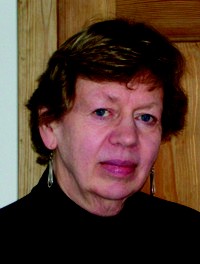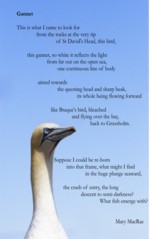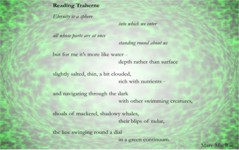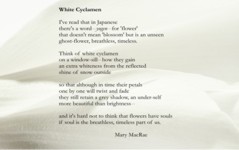

Mary’s central interest throughout her life was in poetry though she started writing it seriously only in her mid fifties. Living in London, it was a good time to start; the London poetry scene was both lively and accessible. She found her way to the circle round Magma magazine, which she subsequently helped to edit, to Myra Schneider’s classes and to the Poetry School where, in Mimi Khalvati’s taught and workshop classes, she encountered a diverse group of poets who provided an exceptionally nourishing creative environment.
Mary’s poems are rhythm driven and often use strict form. Some of her poems evoke an inner landscape based on a response to the natural world, others focus on specifically female experience such as child bearing. Many deal, directly and indirectly, with mortality.
She published widely in poetry magazines and her first collection, As Birds Do, appeared in 2007 from Second Light; a further volume, Inside the Brightness of Red, was published in 2010, also by Second Light.
Mary was born in Bournemouth. After her father’s demobilisation the family regrouped in Wallington, a leafy suburb of South London. She was devoted to her mother and younger sister; relations with her father, though, were always uneasy. At home, money was tight and horizons limited but she acquired from her High Anglican parish church a sense of the spiritual without, to her regret, acquiring a faith. Mary was a bright child and won a scholarship to Croydon High School which led on to a place at Newnham to read English.
Newnham and Cambridge opened windows onto a wider world, something of which she was always appreciative, while the unthinking arrogance she encountered in many of her male contemporaries fortified her innate feminism. Although she lived mostly out of college, she delighted in Newnham’s gardens. A year was spent between Part I and Part II as an assistante in the depths of Brittany through the harsh winter of 1962.
A period of uncertainty and depression followed Cambridge – there was an unsuccessful relationship and then her mother’s premature death – during which she abandoned some misconceived research at Oxford and “fell into” teaching English at a rough girls’ comprehensive in West London. This proved to be a lifeline. She enjoyed the teaching, liked the pupils – well, found them interesting, at any rate – and made lifelong friends among the staff. This work and the support of a woman friend enabled her to benefit fully from the course of psychotherapy she undertook.
We married in 1972 and while our daughter was young Mary taught part time in adult education. During these years she directed her creative energies into music (she became a good ensemble recorder player) and cooking (she won an Independent Cook of the Year competition). At a crisis in my own career she supported us by getting a job at a large girls’ independent school in South London. She enjoyed the teaching and the pastoral work she did, eventually as joint Head of Sixth Form, and she valued the opportunity it gave to organise a highly successful annual Poetry Writing Festival. But during her time here the school went through a traumatic episode and Mary always felt that this had impacted negatively on its general atmosphere.
Mary loved holidays and travel. She took an almost child-like pleasure in birds, wild animals, flowers and landscape, especially the landscapes of East Kent and Pembrokeshire. She had a good eye for paintings and a good ear, preferring chamber music and opera. She was supportive and generous, sometimes hasty and impatient. Mary’s temperament was naturally exuberant but in deference to social convention she usually toned this down. Despite her many talents, she was diffident about herself.
Mary contended uncomplainingly for much of her life with ill health. There were frequent back problems, compounded by a freak accident in which she suffered a major neck fracture. These brought constant discomfort, often pain, and restricted activity. Breast cancer episodes in 1998 and 2003 were successfully treated but the cancer returned, by late 2008 as spinal cancer which caused increasingly severe disablement. She encountered her final illness stoically. She said she wanted to make a good death and she did.
Apart from me, she leaves behind a daughter and son-in-law, Flora and Huw, three grandchildren, Emyr, Anwen and Owain, and her sister Deborah.
Lachlan MacRae (husband)
See more at Publications




